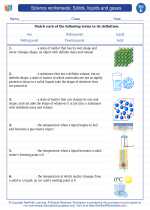Process of Denitrification
During denitrification, specialized bacteria called denitrifiers use nitrates as a source of oxygen for respiration. They convert nitrates into nitrogen gas or nitrous oxide, releasing it into the atmosphere. This process helps to balance the nitrogen levels in the environment and prevents an excess of nitrates, which can lead to water pollution.Importance of Denitrification
Denitrification plays a vital role in maintaining the balance of nitrogen in the environment. It helps to remove excess nitrates from soil and water, preventing the over-fertilization of ecosystems. Additionally, denitrification contributes to the regulation of atmospheric nitrogen, which is essential for the growth of plants and other organisms.Study Guide
- Definition: Denitrification is the process by which bacteria convert nitrates into nitrogen gas or nitrous oxide in anaerobic conditions.
- Conditions: Denitrification occurs in environments with low oxygen levels, such as waterlogged soils or sediments.
- Importance: It helps to maintain nitrogen balance, prevent water pollution, and regulate atmospheric nitrogen levels.
- Role in the nitrogen cycle: Denitrification is a crucial step in the nitrogen cycle, completing the conversion of nitrogen compounds back into atmospheric nitrogen.
- Environmental impact: Understanding denitrification is essential for managing agricultural practices, preventing water contamination, and preserving ecosystem health.
[Denitrification] Related Worksheets and Study Guides:
.◂Science Worksheets and Study Guides Fifth Grade. Science worksheets: Solids, liquids and gases.
Study Guide Solids, liquids and gases
Solids, liquids and gases  Worksheet/Answer key
Worksheet/Answer key Solids, liquids and gases
Solids, liquids and gases  Worksheet/Answer key
Worksheet/Answer key Solids, liquids and gases
Solids, liquids and gases  Worksheet/Answer key
Worksheet/Answer key Solids, liquids and gases
Solids, liquids and gases  Vocabulary/Answer key
Vocabulary/Answer key Solids, liquids and gases
Solids, liquids and gases 

 Worksheet/Answer key
Worksheet/Answer key
 Worksheet/Answer key
Worksheet/Answer key
 Worksheet/Answer key
Worksheet/Answer key
 Vocabulary/Answer key
Vocabulary/Answer key

The resources above cover the following skills:
PHYSICAL SCIENCE (NGSS)
Matter and Its Interactions
Students who demonstrate understanding can:
Make observations and measurements to identify materials based on their properties.